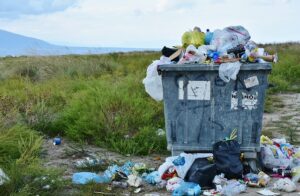We all have a responsibility for our planet and each individual can make a contribution. The throwaway society must come to an end and every private household can contribute by making and implementing sustainable choices. Here you can find out how you can contribute.
Introduction: The environmental impact of the throwaway society
The throwaway society has had an enormous impact on our environment over the past decades. The consumption of disposable products and the short lifespan of many products have led to an ever-increasing mountain of waste. The production and disposal of these products not only pollutes the environment, but also our health. The production of disposable products consumes valuable resources such as water, energy and raw materials, while their disposal often leads to pollution and landfill overload. It is therefore time for us to realise how important it is to change our consumption habits and do our bit to reduce the throwaway society.
The impact of disposable products on the environment
As private households, we can make an important contribution to bringing about the end of the throwaway society. Disposable products have a huge impact on our environment. Disposable plastic packaging, paper cups and plates, disposable razors or wet wipes – all these products are used only once and then thrown away. But this has consequences for our environment: the production of the products requires resources such as petroleum or wood and consumes energy. In addition, the waste has to be disposed of, which often leads to soil and water pollution. In addition, many of these products are not biodegradable and therefore remain in nature for a long time. As a private household, this is where we can start: We can rely on reusable alternatives and thus make our contribution to environmental protection.
Why private households can make an important contribution
As a private household, you can make an important contribution to ending the throwaway society. By consuming more consciously and paying attention to the products you buy, you can contribute to producing less waste. Repairing and reusing items can also help prevent them from simply being thrown away. In addition, by disposing of waste in an environmentally conscious way, you can ensure that it does not simply end up in landfills or lying around in nature. Every small step counts, and as a private household you have the opportunity to do your part to protect our environment.
Tips for a sustainable lifestyle in everyday life
 There are many ways to lead a sustainable lifestyle in everyday life. For example, you can avoid plastic and instead use reusable alternatives such as glass or stainless steel bottles and cans. Buying seasonal and regional fruit and vegetables can also help reduce your ecological footprint. Another tip is to switch to environmentally friendly cleaning products or even make homemade cleaning products. Saving energy by switching off appliances in standby mode or investing in energy-efficient appliances can also help reduce the environmental footprint. Every small step counts to contribute to sustainability as a private household and thus drive an end to the throwaway society.
There are many ways to lead a sustainable lifestyle in everyday life. For example, you can avoid plastic and instead use reusable alternatives such as glass or stainless steel bottles and cans. Buying seasonal and regional fruit and vegetables can also help reduce your ecological footprint. Another tip is to switch to environmentally friendly cleaning products or even make homemade cleaning products. Saving energy by switching off appliances in standby mode or investing in energy-efficient appliances can also help reduce the environmental footprint. Every small step counts to contribute to sustainability as a private household and thus drive an end to the throwaway society.
Opportunities to reuse and repair products
One of the most important ways to promote the end of the throwaway society and make your contribution as a private household is to reuse and repair products. Instead of throwing away old items and replacing them with new ones, we should repair or reuse them. This can be achieved by buying used products or participating in local swap or repair initiatives. There are also many online resources that provide instructions on how to repair items. By using and repairing products, we not only help to reduce waste, but also save resources and reduce our environmental impact. As a private household, we have the power to change our consumption habits and make a positive impact on society and our environment.
How to avoid waste and dispose of it properly
As a private household, you can make an important contribution to ending the throwaway society by avoiding waste and disposing of it properly. One way to avoid waste is to avoid disposable products such as plastic crockery or cutlery and use reusable alternatives instead. You should also take care to reduce food waste by only buying as much as you need and using leftovers wisely. When disposing of waste, it is important to separate the different types of waste and dispose of them correctly in the bins provided. By taking these simple measures, you can help reduce the environmental impact of waste and thus have a positive effect on our society and environment.
The importance of recycling and upcycling in modern society
In modern society, recycling and upcycling are becoming more and more important. We live in a world where resources are becoming scarce and environmental pollution is constantly increasing. Therefore, it is important that every individual does his or her part to protect the environment. Recycling and upcycling are two important approaches to reducing waste and conserving valuable resources. Recycling allows reusable materials such as paper, glass or metal to be returned to the production cycle. In upcycling, waste products are transformed into new products through creative ideas. This often results in unique and individual objects that are not only environmentally friendly but also make a statement for sustainability. As a private household, you can make an important contribution by separating and recycling your waste and by using upcycling ideas. In this way, we contribute together to making our world more sustainable and ensuring a future for generations to come.
Conclusion: Everyone can make a contribution to end the throwaway society
In conclusion, every individual can make a contribution to ending the throwaway society. It already starts with small behavioural changes in everyday life, such as consciously buying products with a longer shelf life or doing without disposable packaging. Repairing and reusing items instead of quickly buying new ones also helps to conserve resources and reduce the burden on the environment. Every single household can thus make an important contribution and become part of a movement towards a more sustainable society.

